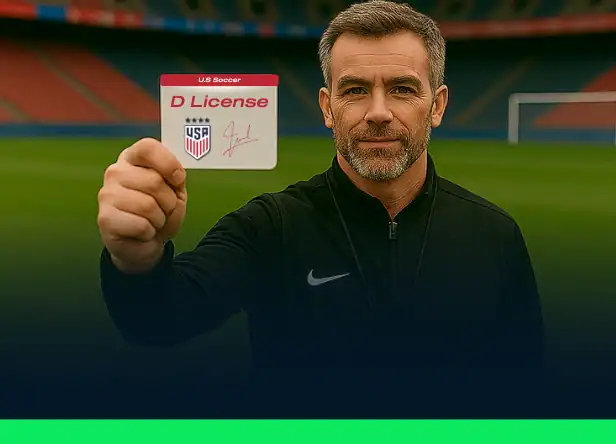Learning how to become a soccer coach opens doors to a rewarding career that combines your passion for the beautiful game with the opportunity to develop the next generation of players.
With soccer’s growing popularity in the United States and a projected 20% job growth rate for coaches through 2028, there has never been a better time to pursue this fulfilling career path and SoccerEdu is here to provide you with every information that you need to start your soccer coaching career.
Understanding the Soccer Coaching Career Landscape
Before diving into the specific steps on how to become a soccer coach, it’s essential to understand the diverse opportunities available. Soccer coaching career encompasses various levels, from youth recreational leagues to professional teams, each with distinct requirements and pathways.
Educational Foundation
Though formal education isn’t always required, most soccer coaches profit from a solid academic foundation. Data from the industry show that 71% of soccer coaches have bachelor degrees, with the most popular majors being:
- Business (14. 3%)
- Health Education (8. 6%)
- Kinesiology (17. 6%)
- Psychology: (7. 1%)
- Education: (5. 7%)
A degree in sports science, physical education, or related disciplines offers useful knowledge about human movement, sports psychology, and athlete growth that directly benefits coaching.
How to get Started as a Soccer Coach?

Step 1: Develop your Soccer Knowledge and Experience
Playing Background
Although not absolutely essential, a background in football helps you to improve your coaching legitimacy and game knowledge greatly. Former players offer insightful views on:
- Game dynamics and technique
- Player attitude and motivation
- Methods and technical knowledge
- Leadership and group dynamics
Volunteer and Assistant Coaching
Learning how to become a soccer coach is best done through actual exposure. Many famous coaches started off as volunteers with neighborhood youth groups, recreational leagues, or school teams. This interaction provides experience in handling different personalities, knowledge of age-appropriate training techniques, applied coaching skills, game management and strategy awareness.
Step 2: Obtain Required Certifications and Licenses
US Soccer Coaching License Pathway
The United States Soccer Federation (USSF) offers a comprehensive coaching license system that serves as the gold standard for soccer coaching career credentials in the US.
Grassroots Level
Every coaching path starts with the Grassroots route, which entails:
- A free 20-minute online video providing fundamental coaching ideas and introduces to Grassroots Coaching.
- Small-sided game modules: 4v4, 7v7, 9v9, and 11v11 forms cost $25 each.
- Requirement: Complete two in-person or blended modules to advance to the D License
D License
The D License is the entry point for formal coaching credentials and allows you to coach teams from U6-U19 in participation-focused environments. Requirements include:
- Completion of grassroots prerequisites
- Four in-person courses over nine weeks
- Assignments and mentoring sessions
- Virtual meetings with coach educators
Progressive Licensing
The coaching license pathway continues with:
- C License: For intermediate-level coaching with more tactical focus
- B License: Required for higher-level youth and amateur adult teams
- A License: Necessary for professional and elite youth coaching
- Pro License: The highest level of certification for soccer coaching career and professional team coaching
The United Soccer Coaches organization offers additional pathways that complement USSF licenses:
Foundations Diplomas
- 4v4 Foundations: For coaches working with young players (typically U8 and under)
- 7v7/9v9 Foundations: Focused on 9-12 year old player development
- 11v11/Pre-National: Designed for coaches of 13+ players
Advanced Diplomas
- National Diploma: 40-hour program covering technical, tactical, psychological, and physical aspects
- Advanced National Diploma: Emphasis on team organization and advanced methodology
- Premier Diploma: The highest level of United Soccer Coaches certification
Step 3: Essential Skills and Qualifications
Core Coaching Skills
To answer how to become a soccer coach, you must know that successful soccer coaches have to master several key competencies like technical knowledge which includes understanding of soccer fundamentals and techniques, knowledge of game tactics and formations, ability to teach proper ball control, passing, and shooting techniques, etc. Communication skills which includes clear instruction delivery, active listening abilities, effective feedback provision, conflict resolution skills to smoothly manage different players, and also a successful soccer coach must have Leadership qualities, which means he must have the ability to motivate and inspire players, decision-making under pressure, team building and management, and to maintain a positive role modeling within the team.
Additional Certifications
Safety and First Aid: Most coaching positions require additional safety certifications mentioned below
- CPR and First Aid: Essential for responding to medical emergencies during practices and games
- AED Training: Many organizations require Automated External Defibrillator certification
- Concussion Awareness: Mandatory training for recognizing and managing head injuries
Background Checks: Youth soccer coaching positions typically require the following
- Criminal background checks
- Child protection screening
- SafeSport training
- Reference checks
Step 4: Gain Practical Experience
Volunteer Opportunities
Volunteering provides invaluable experience and networking opportunities. Consider Local youth clubs. Many organizations welcome volunteer coaches, especially for recreational programs. There are also school programs that have assistant coaching positions at elementary, middle, or high schools. Community centers are another way of getting opportunities for volunteering as recreation leagues often need additional coaching support. Soccer camps like summer camps are also available that provide intensive coaching experience.
Mentorship and Shadowing
Learning from experienced coaches also accelerates your development. You can observe training sessions and match management, ask questions about session planning and player development, understand different coaching philosophies and methods, and most important – build relationships within the soccer community.
Step 5: Build your Professional Network
Networking Strategies
Career growth in the sports field as a soccer coach requires that you are able to reach out to your professional network. Attending coaching workshops and seminars enables you to have many opportunities to meet and talk with other coaches and business people, get acquainted with the newest coaching tactics and methods, and discover job openings.
Besides that, such events will be the place where you can informally exchange your innovative ideas and best practices, thus further coaching style improvement. Also, besides meeting people in person, using social media platforms such as Twitter and LinkedIn can be a great way to increase your outreach exponentially.
Speak and cooperate with other football coaches, share your opinion, get ideas, learn from professional teams, be actively engaged in organizing online coaching forums, and thus, you will be more recognizable and authoritative in the football coaching niche. Besides, do not forget to keep in touch with your local football network regularly.
You will get the true experience of your journey when you attend games and competitions, become a member of coaching groups and associations, and at the same time, clinics and volunteer work for special events. It will, however, allow you to make close friendships with peers and also mentors. When networking becomes real and consistent, it focuses on building true relationships based on support and interest and thus it becomes most effective.
While attending events, being thoughtful when engaging with social media, and integrating yourself into your community soccer culture, you can construct a solid network that not only makes your professional growth easy but also opens you to new coaching opportunities.
How much can you Earn as a Coach? Career Progression and Opportunities
Most soccer coaches start with recreational youth teams, where they often instruct youngsters between the ages of 4 and 12, and concentrate on developing their love of the game and imparting basic skills. Others get priceless experience as assistant coaches, assisting head coaches at different levels, or by way of volunteer work in their close neighborhood.
Seasonal roles offer more opportunities to acquire coaching experience and interact with players in a more concentrated setting. Soccer camp teaching positions, for instance, provide such possibilities. These entry-level jobs offer the beginning experience necessary to advance in the coaching field. Coaches can advance to more competitive levels as they hone their skills and obtain higher-level qualifications, including coaching travel teams, junior varsity or varsity squads in high school.
Chances rise to include coaching in college, where positions vary from assistant to head coach, and for those with considerable experience and credentials, expert coaching jobs inside leagues like MLS and USL. Salaries usually change by level and region; young coaches make some $15 to $25 an hour or $30,500 to $50,000 annually; high school coaches typically make $3,000 to $12,000 annually; college coaches make between $40,000 and $100,000 or more; and professional coaches earn salaries from $50,000 to over $1 million for top roles. To advance in the line of employment of a soccer coach, more expertise, credentials, and improvement of coaching abilities are needed.
Tips for Success
Good football coaches recognize the value of careful session preparation and organization. Ensuring that activities are appropriate for each player’s stage of development and age, they create organized training sessions with defined objectives and a reasonable progression. Planning is essential; having all equipment ready and maintaining a secure environment not only promotes seamless processes but also gives player safety first importance.
Besides structure, successful coaches encourage all-around player development by means of individual technical ability development, team strategy instruction including roles and formations, as well as physical conditioning and mental preparation to build confidence and resilience
Great coaches define themselves by constant learning. Coaches stay flexible and well-informed about best practices by regularly attending seminars and clinics, reviewing game footage, reading contemporary coaching publications, and soliciting comments from both players and peers. Within their teams, they also negotiate usual difficulties like managing varied personalities, ability levels, and backgrounds.
Maintaining fun with competition is especially important in youth soccer, where player retention and development depend on enjoyment, encouragement of participation, and management of parental expectations all play a part. Last of all, good time management guarantees that coaches can satisfy the demands of their position while creating a favorable, efficient environment for their players—covering match analysis, player assessment, administrative duties, and training planning.
Becoming a Soccer Coach, in conclusion
Becoming a soccer coach calls for commitment, ongoing education, and real passion for helping players grow. Obtaining suitable certifications through groups like US Soccer and United Soccer Coaches starts the trip of a successful soccer coaching career; then comes real experience gained via mentoring and volunteer activities. Maintaining the right safety certifications and background checks and cultivating excellent technical knowledge, communication skills, and leadership characteristics determines success in football coaching.
Creating a professional network via conferences, social media, and local community involvement provides advancement opportunities. Those who invest in the right training and development will discover fulfilling job possibilities at every level—from adolescent leisure leagues to professional teams—as soccer keeps growing and the demand for competent coaches increases. Beginning with the basics, getting experience, and never ceasing learning in this vibrant and satisfying career is the secret.





